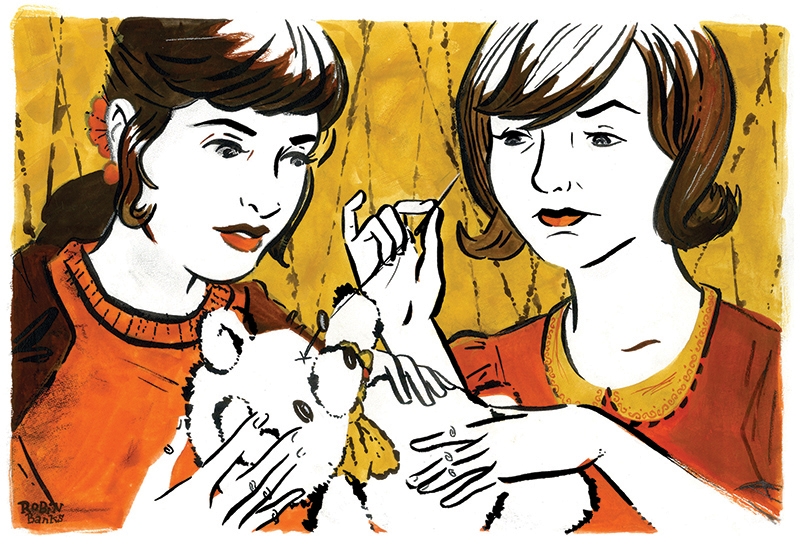
Illustration by Robin Banks
“I think I’m always optimistic,” says Tracyanne Campbell from her flat in Glasgow. “It might not seem like that, but I think I’m always, ultimately, trying to look on the bright side.” As the leader of the Scottish group Camera Obscura, Tracyanne Campbell needs hardly any introduction at all—she’s one of the brightest-shining indie stars of the last decade. From a diverse body of influences, ranging from classic country to melancholic British indie-pop, Campbell and her bandmates have built a stellar body of work, replete with catchy tunes and supremely bittersweet, sardonic lyrics. It’s music that you’ll want to listen to while riding your bike through town on a sunny day, or while doing the wash outside your two-flat, or while strolling though the hills above your midsize city contemplating the next Johnny-come-lately that’s gonna sweep you off your feet. Ultimately, Camera Obscura remains a heartwarming outfit of pop that documents the great universals of life, love, heartache and tender affection.
Over the band’s 17-year-and-counting career, they’ve released records with three seminal indie labels—Spain’s Elefant, America’s Merge and lately, Britain’s 4AD. Campbell briefly explains the band’s development as such: “The band was an idea around ’94. We started learning to play instruments and trying to write songs. We had our first single in 1996, but it was 2001 before we made an album,” she says. They found a friend in Belle & Sebastian’s Stuart Murdoch, who produced their beautiful, early single “Eighties Fan.” The great critical reception (including generous lauding from the late John Peel) of their 2001 debut, Biggest Bluest Hi-Fi, and 2006’s Let’s Get Out Of This Country set Campbell on a Scottish indie-pop pedestal that is sometimes hard to dismount.
Scotland—Glasgow especially—has a rich, independent pop heritage, which Campbell views ambivalently: “To a certain extent, we may be influenced by other Scottish bands, but it’s to do with the fact that they’ve done it,” she says. Camera Obscura is often considered a plain indie-pop band in the Scottish tradition (of bands like Orange Juice, Lloyd Cole and the Commotions and The Pastels). “I don’t care what people call us,” says Campbell. “A lot of the time, we’re pop, so, fair enough,” she says. What Campbell and company have over the indie-pop masses is a singular fusion of melancholia and exuberant music—beyond jangly guitars and tambourines, they color their songs with vibrant, orchestral flourishes. Pop has great advantages—according to Campbell, “There’s no filter—it penetrates right into your heart and soul. It’s easy to listen to, it makes you happy, it can make you sad,” she says.
With the group’s new album, Desire Lines (released by 4AD on June 4), Campbell enriches her infamous melancholy with American friends and friendly voices. “When we made Desire Lines, we were optimistic,” says Campbell. “I think we had to be, for many reasons.” They recorded the new album in Portland with producer Tucker Martine (who has worked with The Decemberists and Sufjan Stevens, among others), on a recommendation from Merge label-mate M. Ward. “We specifically decided that we would make a record in the States this time,” she says. “I was brought up listening to a lot of American music—we all were,” she says. Among her influences, “American country music is a big factor, and Motown and Soul, American pop music, California pop music as well,” she says. The group’s previous two albums were recorded in Stockholm, Sweden, where time constraints prompted more spontaneous, sometimes rushed recordings. “For [Desire Lines], we had a bit more breathing space: [Martine’s] a very patient producer,” says Campbell. Jim James (of My Morning Jacket) and Neko Case provided backup vocals on a couple of tracks, also. “We were delighted that Jim and Neko could sing on the record,” she says. “They’re two of my favorite singers, ever, on the planet—it was almost surreal to think that they actually took part in our record.” Case joined the band in the studio to record backing vocals for the track “Fifth In Line To The Throne.” “She’s just a ball of energy—a very funny, clever lady,” says Campbell. “She worked really hard, spent quite a few hours banging it out—it was a thrill.”
Camera Obscura will be embarking on an American tour in support of Desire Lines this summer. “The prospect of going on tour to the States is a fun one,” Campbell says. “I just hope that people are looking forward to seeing us—we’re looking forward to getting back.” She’s excited to come back to Salt Lake as well: “It’s a place that we haven’t been too often,” Campbell says. “I guess I’ll just have a surprise when I arrive.”
We’ll make it pretty, Tracyanne—see Camera Obscura’s bittersweet heart swell at Urban Lounge June 26.


